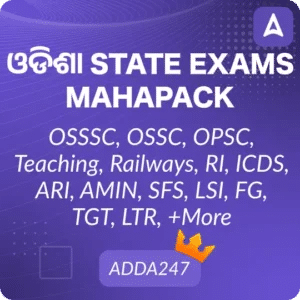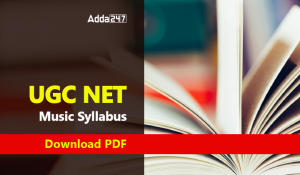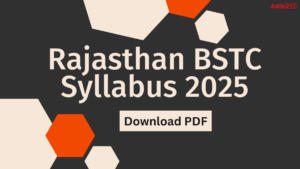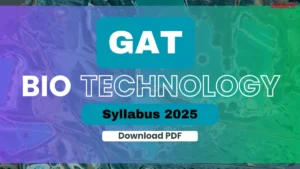Table of Contents
The Directorate of Secondary Education (DSE) has published the DSE Odisha Teacher Syllabus 2024 on the official website to help candidates prepare for the teaching vacancies they are planning to release soon. The selection examination for the recruitment will be conducted through Computer Based Test Exam which will be held in selected Test Centres across Odisha. Hence, candidates must get started with the preparation for the upcoming exam by thoroughly scrutinizing the DSE Odisha Teacher Syllabus 2024. Read the following article for more information on the DSE Odisha Teacher Syllabus 2024, candidates are advised to check out the following article.
DSE Odisha Teacher Syllabus 2024
The DSE Odisha Syllabus 2024 plays an important role in guiding candidates preparing for the Odisha Directorate of Secondary Education (DSE) exams. It provides a comprehensive outline of the topics and subjects that will be covered in the examination, helping aspirants structure their study plans effectively. Therefore, candidates are highly recommended to go through the DSE Odisha School Teacher Syllabus mentioned below.
DSE Odisha Exam Pattern 2024
The DSE Odisha consists of two papers as per the DSE Odisha Teacher Syllabus 2024. Paper 1 is common for all posts, with questions available in both Odia and English, while Paper 2 focuses on the specific subject relevant to the post. The test has a total duration of 15 minutes and comprises 150 objective-type multiple-choice questions, each carrying 1 mark, leading to a total of 150 marks. There is a negative marking system, where 0.25 marks will be deducted for each incorrect answer. Candidates must carefully manage their time and accuracy to maximize their scores.
- Total paper -2
- Paper 1 – Common for All Post
- Question Language for Paper 1- Odia and English
- Paper 2 – Subject Concerned for Post
- Test Duration – 15 Minutes
- Total Questions – 150 Objective Type Multiple Choice Question
- Total Marks- 150 marks
- Marking System – 1 mark
- Negative Marking – 0.25 marks
DSE Odisha Marks Distribution 2024
The DSE Odisha Marks Distribution 2024 consists of two papers. Paper I, common for all posts, includes 30 questions for 30 marks, with subjects like General Knowledge & Current Affairs, Reasoning Ability, Computer Literacy, and Child Development Pedagogy in Odia and English. Paper II is subject-specific, featuring 60 questions for 60 marks, tailored to the teaching post. For example, Hindi Teachers answer in Hindi, Sanskrit Teachers in Devanagari Sanskrit, Physical Education Teachers in Odia & English, and subject-specific questions for TGT Science (PCM & CBZ), TGT Arts – Social Studies, and Telugu Teachers.
| DSE Odisha Marks Distribution 2024 | |||||
| Post | Paper | Number of Questions | Full Marks | Question Language | Subjects |
| All Post | I | 30 | 30 | Odia and English | General Knowledge & Current Affairs |
| 20 | 20 | Reasoning Ability | |||
| 10 | 10 | Computer Literacy | |||
| 30 | 30 | Child Development Pedagogy, Educational Management, Policy& Evaluation | |||
| Hindi Teacher | II | 60 | 60 | Hindi | Hindi |
| Sanskrit Teacher | II | 60 | 60 | Devanagari | Sanskrit |
| Physical Education Teacher | II | 60 | 60 | Odia & English | Physical Education |
| TGT Science – PCM | II | 60 | 60 | English | Physics, Chemistry, Mathematics |
| TGT Science – CBZ | II | 60 | 60 | English | Chemistry, Botany, Zoology |
| TGT Arts – Social Studies | II | 60 | 60 | English | History+ Political Science, Geography + Economics, English |
| Odia | History+ Political Science, Geography + Economics, Odia | ||||
| Telugu Teacher | II | 60 | 60 | Telugu | Telugu |
DSE Odisha Syllabus 2024 for Paper I (Common For all Posts)
- Total Marks -90 marks
- Subjects – General Knowledge and Current Affairs, Reasoning Ability, Computer Literacy, Pedagogy, Educational Management, Policy and Evaluation
Section – I General Knowledge and Current Affairs – (30 Marks)
- Current Events of State (Odisha) of National and International Importance
- History of Odisha/ India and the Indian National Movement
- Indian and World Geography
- Indian Polity
- Economic and Social Development
- Everyday Science
Section – II Reasoning Ability – (20 Marks)
- General mental ability,
- Logical reasoning and analytic ability
- Decision-making and problem-solving
- Basic numeracy
- Data interpretation
Section – III Computer Literacy – (10 Marks)
- Basic computer literacy skills for the use of ICT in classrooms
- Concepts, terminology and operations that relate to general computer usage.
- Basic Hardware of Computer
- Common Applications,
- Networking and Internet
- Social Networking
- Digital Citizenship
Section – IV Child Development, Pedagogy, Educational Management, Policies & Evaluation – 30 Marks
Check out the DSE Odisha Teacher Syllabus 2024 for the posts of Hindi, Sanskrit, TGT Arts, TGT Science (PCM), TGT Science (CBZ) and Telugu Teacher mentioned below.
-
Child Development (Process of Growing Up)
| Child Development (Process of Growing Up) | |
| Growth and Development |
|
| Factors Affecting Different Developmental Aspects |
|
2. Learning Process / Pedagogy
| Learning Process / Pedagogy | |
| Understanding the Learning Process |
|
| Organizing Learning |
|
| Addressing Classroom Diversity |
|
3. Educational Management
- Educational Management: Concept, Importance and Scope, Types of Management, Democratic and Autocratic, Centralized and Decentralized
- Management Structure at different levels, National/State/ District/Sub-district (BRCS, CRCS, SMCS, SMDC)
- School Development Plan (SDP): Concept, purpose, Key action by Headmaster, students, Parents and SMDC
4. Educational Policies and Programmes
- National Educational Policy 2020
- RTE Act, 2009
- National Curriculum Framework, 2005
- SSA, RMSA and Samagra Shiksha
5. ASSESSING THE LEARNER / PERFORMANCE (EVALUATION)
| ASSESSING THE LEARNER / PERFORMANCE (EVALUATION) | |
| Assessment and Evaluation |
|
| Assessment and Learning |
|
| Test Construction |
|
| Recent Developments in Assessment |
|
Section – IV Pedagogy, Educational Management, Policies & Evaluation – 30 Marks
In the following section, candidates will find the DSE Odisha Teacher Syllabus 2024 for the post of Physical Education Teacher (PET).
-
Child Development (Process of Growing Up)
- Growth and Development
- Meaning of Growth & Development
- Different Stages of Development
- Physical, Mental, Emotional and Social Development of a Child
- General Characteristics of various stages of Growth and Development of a Child
2. Pedagogy
- Teaching Techniques (Lecture method, Demonstration Method, Discussion method and Project method etc.)
- Important Devices and Methods of Teaching
- Teaching Procedure – Whole method, Part method, Whole and Part method
- Difference between teaching methods and Teaching Aids
3. School Management & Evaluation
- School Management
- Programme planning, principles of programme planning in Physical Education
- The function of planning – organisation of school sports, coordination and
- contracting of Physical Education activities
- Evaluation of School Physical Education Activities and School Health Education Programme
Download DSE Odisha Teacher Syllabus for Paper I PDF
Paper I consists of various sections which include General Knowledge and Current Affairs, Reasoning Ability, Computer Literacy, Pedagogy, Educational Management, Policy and Evaluation. This section carries 90 questions for 90 marks.
Download DSE Odisha Syllabus 2024 for Paper II PDF
Paper II consists subject concerned with which the candidate will apply. This section carries 60 questions for 60 marks. All the candidates can download Download DSE Odisha Syllabus for Paper II PDF which is given below. The examination will be a computer-based exam.




 UGC NET Music Syllabus 2025, Download PD...
UGC NET Music Syllabus 2025, Download PD...
 Rajasthan BSTC Syllabus 2025, राज�...
Rajasthan BSTC Syllabus 2025, राज�...
 GAT B Syllabus 2025, Check Section-wise ...
GAT B Syllabus 2025, Check Section-wise ...














